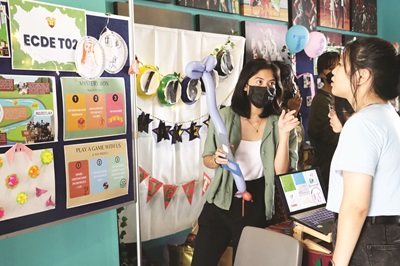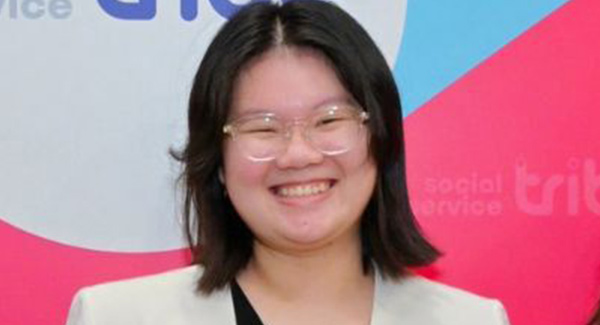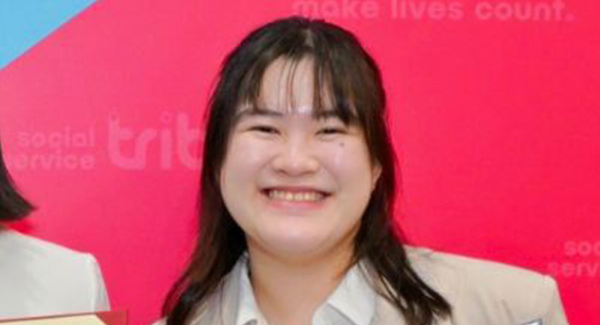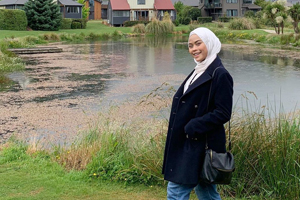Why ECDE?
- Experience practice-oriented training with a six-month enhanced internship programme and two practicum attachments
- Expand your career options by pursuing either the Early Intervention Specialisation or Mother Tongue Language Teaching Specialisation (Chinese or Tamil) when you take up relevant electives*
- Enjoy full course fee sponsorship, professional development grant and monthly allowance with the Early Childhood Development Agency (ECDA) Training Award
- Gain an extra edge with NP's signature Personalised Learning Pathway and graduate with a Diploma + Minor of your choice!
*subject to terms and conditions
About ECDE
Love interacting with children and want to make a meaningful impact in shaping their growth? Our Diploma in Early Childhood Development & Education (ECDE) is the right course for you!
This course is conducted by the National Institute of Early Childhood Development (NIEC) in collaboration with NP at the NIEC (NP) campus. The qualification is recognised by the Early Childhood Development Agency (ECDA) for graduates to be certified and practise as an early childhood educator in Singapore.
Starting from your first year, you will build a strong foundation in understanding child development, early childhood care, and education for young children from birth to 6 years old. Gain hands-on experience through attachments at preschools, where you will have the opportunity to apply the skills you have learnt under the guidance of experienced educators.
Pursue practicum in your second year while learning about the holistic development of a child, as well as curriculum planning and design. Having learnt how to encourage children to be curious learners and problem solvers, you will put your skills into practice during a six-month internship at a preschool in your final year.
In your final year, choose to deepen your expertise in the Early Intervention Specialisation or the Mother Tongue Language Teaching Specialisation (Chinese or Tamil), or explore electives like Children’s Literature and Drama for Preschool Education. You may even choose to take up the 2D & 3D Art modules conducted at another NIEC campus*.
*subject to terms and conditions
Upon graduation, you will become a certified early childhood educator to teach children aged 18 months to 6 years old. The sector has seen significant growth over the past few years and is expected to continue to grow with rising demand for early childhood services. This growth would mean that you can expect employment opportunities and job security in the sector.
Students enrolled in ECDE are eligible for the ECDA Training Award. It includes full course fee sponsorship and a monthly allowance of $800*! Find out more at bit.ly/ECDAaward.
*subject to terms and conditions
Overview of your ECDE journey
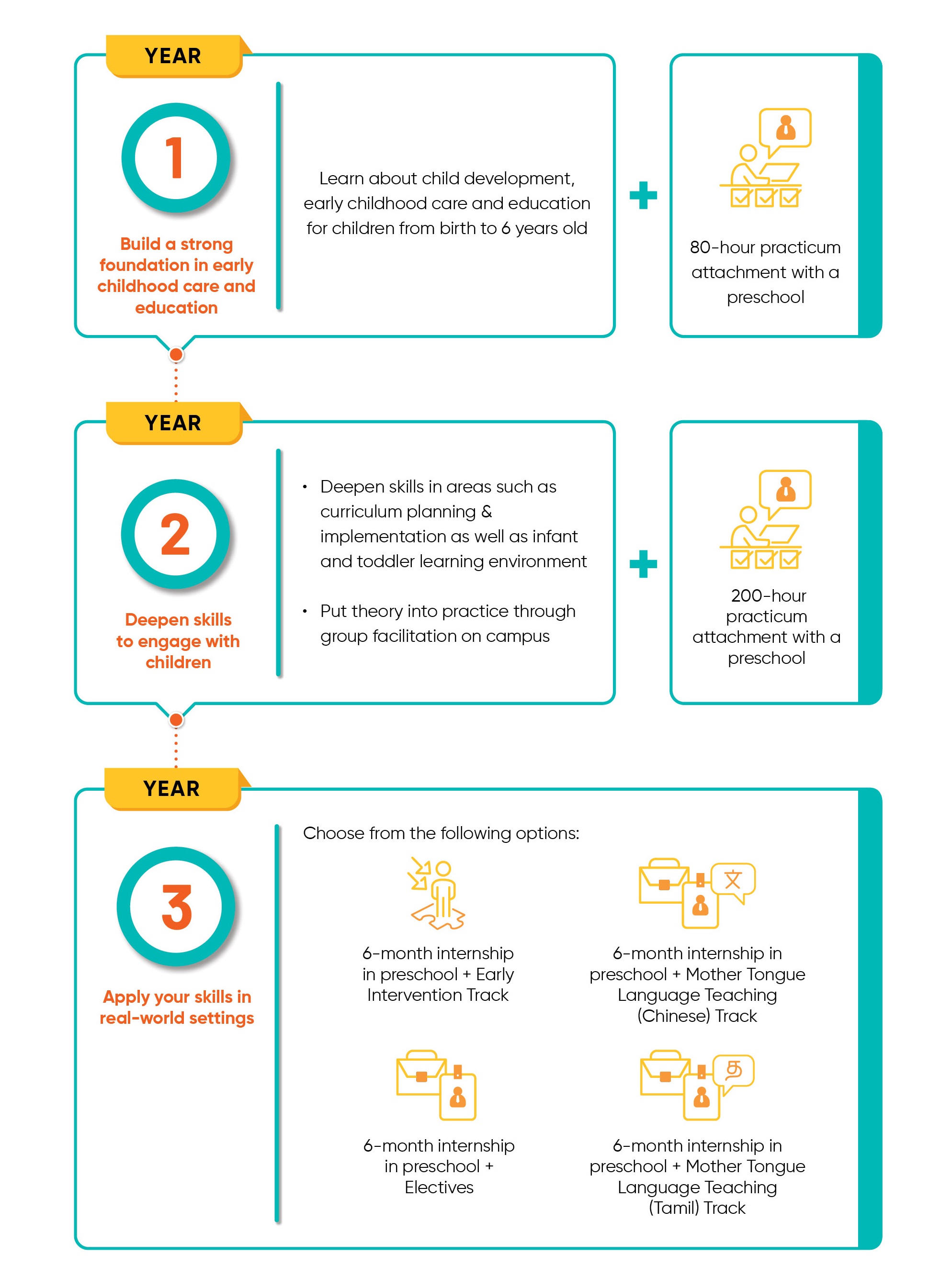
Inspiring Portfolio
Further Studies
Learning doesn't stop after you enter the sector. Take your early childhood career to the next level and deepen your expertise with NIEC's Specialised Certificates, Continuing Professional Development, and Post-Diplomas courses. These courses will equip you to progress into roles such as Lead Preschool Teacher, Centre Principal, Learning Support Educator, Early Intervention Educator, and more.
If you are considering furthering your studies, our diploma is recognised by local and overseas universities for admission. At Institutes of Higher Education offering early childhood-related degrees, you may be eligible for advanced standing and be granted exemptions.
Singapore
- Singapore University of Social Sciences (SUSS)
- Bachelor of Early Childhood Education with Minor
Australia
- Deakin University
- Bachelor of Early Childhood Education
- Bachelor of Early Childhood and Primary Education
- Queensland University of Technology (QUT)
- Bachelor of Education (Early Childhood)
- Bachelor of Early Childhood Education (Birth to Five)
- University of South Australia (UniSA)
- Bachelor of Early Childhood: B-5 Years (MBXC)
Careers
As early childhood education gains greater significance in Singapore, the sector offers promising career prospects and a wealth of training opportunities. Awarded by NIEC in collaboration with NP, this diploma qualifies you as a Level 2 early childhood educator*, allowing you to teach children aged 18 months to 6 years, from Pre-Nursery to K2. You can also explore careers in other child development related fields.
With further studies and training, you can find employment in the following areas:
- Child Support and Family Services
- Early Intervention, Special Needs Education
- Curriculum Development
- Play Therapy
- Teacher Education
*In order to be granted teacher certification status by the Early Childhood Development Agency (ECDA) to teach Kindergarten levels, graduates must have a minimum of a B4 grade for GCE O-Level English as a First Language (EL1) or equivalent.
Entry Requirements
AGGREGATE TYPE ELR2B2-A
To be eligible for consideration, candidates must have the following GCE ‘O’ Level examination (or equivalent) results.
| Subject | 'O' Level Grade |
|---|---|
| English Language | 1-6 |
| Any one of the 1st group of Relevant Subjects for the ELR2B2-A Aggregate Type | 1-6 |
| Any one of the 2nd group of Relevant Subjects for the ELR2B2-A Aggregate Type | 1-6 |
Applicants must also have sat for Additional Mathematics/Mathematics and fulfil the aggregate computation requirements for the ELR2B2-A Aggregate Type (English Language, 2 relevant subjects and 2 other best subjects) listed at www.np.edu.sg/docs/ELR2B2.pdf.
For students with other qualifications, please refer to the NP website for the entry requirements and admissions exercise period.
Candidates would need to be certified medically fit for study by a certified medical doctor and to work with children according to ECDA's medical requirement for early childhood educators.
What You Will Learn
Child Development 1 (4 Credit Units)
This module introduces students to theories, principles and stages of child development, with an emphasis on birth to three years of age. There will be discussion on children’s personalities, temperaments, strengths and interests, as well as the factors contributing to children’s growth, well-being, learning and development. Students will learn to make use of various observation and documentation techniques to assess children so as to create a holistic picture of their experiences, development and learning, and to plan meaningful experiences for each child.
The Early Years: Theory to Practice (5 Credit Units)
Students will be introduced to early childhood care and education landscape in Singapore, including developmentally appropriate practices, early childhood frameworks and code of ethics for early childhood professionals. Philosophy and practices of early childhood centres will be discussed. This module will support students’ learning in the area of children’s safety, health, hygiene, nutrition and socio-emotional well-being. The importance of play and how to incorporate it into daily care routines, transitions and interactions with children will be discussed. This module will also prepare students for the practical aspects of working as well as building trusting and respectful relationships with young children in early childhood settings with a focus on ages 18-month to three. In addition, students will engage in reflective writing on the roles of an early years educator.
Practicum 1 (2 Credit Units)
This module provides students with opportunities to experience the practical aspects of working with young children aged 18-month to three in early years settings. It will support students’ learning in areas of child development, observation and documentation, safety, health, hygiene, nutrition. Students will observe and assist the host teacher in daily care routines and transitions as well as interact with children during play and other activities.
Motor Skills Development (4 Credit Units)
This module equips students with the knowledge, skills and guiding principles to help young children develop perceptual, fine motor and fundamental movement skills, consisting of locomotor, non-locomotor and object control skills, in a safe environment. Students will learn to observe, plan, implement and facilitate fun, meaningful and age appropriate indoor and outdoor play activities that combine fundamental movement skills and concepts. Students will also learn how to observe and assess children’s motor skills development.
Academic Communication & Thinking (4 Credit Units)
This
module aims to develop students' critical thinking, writing and
presentation skills in various academic and professional contexts.
Students will also learn how to conduct basic research and accurately
cite sources in this module.
Career and Professional Preparation 1 (1 Credit Unit)
This module gives students a foundational introduction to their three-year diploma course curriculum and how it prepares them for industry. It will help them to embark on their course with the end in mind, through guided reflection of their personal characteristics and producing an overall game plan for their future education and career goals. The module aims to deepen students’ commitment to the sector that the course prepares them for.
Health & Wellness^ (1 Credit Unit)
This is a Level 1 Core module for all Year 1 students. The module will introduce students to the importance of maintaining both physical and mental health through the knowledge and monitoring of health indicators, and application through appropriate exercises. The aim of the module is to empower students with basic knowledge and skills to be independent and responsible in maintaining overall personal health.
^ Critical Core modules account for 10 credit units of the diploma curriculum. They include modules in innovation and world issues, as well as an interdisciplinary project. By bringing students from diverse diplomas together, the interdisciplinary project fosters collaboration to explore and propose solutions for real-world problems. NP aims to develop students to be agile and self-directed learners, ready for the future workplace.
Language & Literacy (6 Credit Units)
This module introduces students to the theoretical and philosophical underpinnings of language and literacy development from birth to six years of age, including trends and issues within our multilingual society. Students will learn to set up and evaluate the learning environment that helps facilitate language and literacy development. Students will also be trained to identify suitable resources, plan experiences for diverse learners and facilitate learning using appropriate techniques and learning technologies. The use of children’s literature to promote holistic development will be discussed. In addition, this module teaches students how to assess children’s progress and work with families to support their learning.
Child Development 2 (4 Credit Units)
This module introduces students to theories, principles and stages of child development, with an emphasis on birth to three years of age. There will be discussion on children’s personalities, temperaments, strengths and interests, as well as the factors contributing to children’s growth, well-being, learning and development. Students will learn to make use of various observation and documentation techniques to assess children so as to create a holistic picture of their experiences, development and learning, and to plan meaningful experiences for each child.
Aesthetic and Creative Expressions (4 Credit Units)
This module introduces students to an array of visual and performing arts and provides exposure for the appreciation of the creative art forms. In addition, students will develop an understanding about the importance of art experiences in children’s development and discuss issues related to the value of the arts, opportunities for growth and aesthetic development. Theories of creativity and stages of artistic development will also be discussed. Students will learn multiple approaches to engage young children in creative-arts expressions that are aesthetically rich and imaginative. Through both theory and experiential sessions, students will encounter the arts at first hand and will design art experiences that are developmentally appropriate, meaningful and informed by practice.
Workplace Communication Skills (4 Credit Units)
This
module aims to provide students with an understanding of effective
communication practices in the workplace. Students will develop the
necessary skills to communicate effectively with stakeholders,
colleagues, and clients in various communication contexts.
Essential Skills for the Digital Age (4 Credit Units)
This
introductory module is designed to help students build critical digital
skills needed to succeed in the 21st century. The module covers a range
of topics for both the digital workplace and citizenship, including
digital communication and collaboration, data investigation and
analysis, productivity tools, social media, cybersecurity, responsible
use of technology, as well as a roundup of the latest technology trends
and future of technology.
Working with the Exceptional Child (4 Credit Units)
This module introduces students to various exceptional needs in young children including physical, cognitive, behavioural, emotional and sensory characteristics that make them different. Trends and issues in relation to inclusive practices and policies will be covered. Students will learn about the educator’s roles in an inclusive learning environment, especially in designing individualised learning plans and communicating with families. Students will also explore community resources and find out more about professionals that provide support for children with additional needs.Curriculum Planning & Implementation (5 Credit Units)
This module introduces students to the curriculum planning and assessment cycles. The main philosophical and pedagogical principles of various approaches and models of early childhood care and education will be discussed. Students will take reference from the NEL Framework to plan, implement and evaluate developmentally appropriate learning experiences for diverse preschool children that integrate different learning areas and learning dispositions. Students will also learn how to incorporate various types of play, learning technologies and teaching strategies in their planning.
Early Numeracy (4 Credit Units)
This module examines the theoretical framework which underpins young children’s learning of mathematics. Students will be introduced to the principles, knowledge and skills required to plan, implement and evaluate learning experiences that lay the foundations for children to become problem solvers and abstract thinkers. Students will learn to choose developmentally appropriate materials and resources, set up mathematically-rich environment, use effective teaching techniques to nurture children’s mathematical thinking and assess their learning. The use of interactive technology to teach numeracy will also be discussed.
Discovery of the World (4 Credit Units)
This module provides an overview of how young children make sense of the world they live in and how they acquire knowledge and concepts. Students will learn to use the constructivist approach to foster process skills and engage children in exploration through field trips, simple investigations or experiments. Effective teaching techniques, the use of learning technologies and the setting up of a discovery centre that supports children’s inquiry and independent learning will also be discussed. In addition, developmentally and culturally appropriate learning goals and experiences for children from birth to six years of age will be addressed.
Career Kickstart (2 Credit Units)
This module is designed to equip students with the skills and knowledge required to successfully navigate the transition from education to the workplace. Topics covered in this module will include job search strategies, resume and cover letter writing, interview skills, professional networking and personal branding.
World Issues: A Singapore Perspective^ (2 Credit Units)
This module develops a student’s ability to think critically on world issues. Students will discuss a wide range of social, political and cultural issues from the Singapore perspective. It also looks at how city-state Singapore defied the odds and witnessed close to half a century of rapid economic growth, strong political ties and social harmony.
^ Critical Core modules account for 10 credit units of the diploma curriculum. They include modules in innovation and world issues, as well as an interdisciplinary project. By bringing students from diverse diplomas together, the interdisciplinary project fosters collaboration to explore and propose solutions for real-world problems. NP aims to develop students to be agile and self-directed learners, ready for the future workplace.
The Preschool Years: Theory to Practice (6 Credit Units)
This module equips students with the knowledge and skills to take on the role of a teacher assistant for Practicum 2. Students will learn about the principles to design and modify learning environments to support and facilitate the learning and development of preschool children with diverse needs through play and positive interactions. There will be discussion on how to organize daily schedule, set up learning areas with appropriate materials and incorporate the use of technology. Strategies on classroom and behaviour management will be introduced. This module also addresses ways to nurture children to become secure, emotionally connected, and confident individuals through developing their competencies in self-awareness, self-management, social awareness, relationship skills and responsible decision-making. In addition, students will reflect on their roles as a preschool educator and their interactions with children.Infant & Toddler Learning Environment (5 Credit Units)
This module introduces students to strategies to develop respectful, responsive and reciprocal relationships with children, through meaningful and positive interactions, based on their unique characteristics. Students will acquire knowledge and skills to set up or modify the learning environment to support the development of children from birth to three years of age, taking into consideration child development theories and stages of development. Students will also learn to work with families to plan transitions, child-centric experiences and establish routines. In addition, the principles and practices of children engagement and guidance will be covered. The role of assessment through purposeful observation and documentation of children’s behaviour will be emphasised.
Practicum 2 (5 Credit Units)
This practicum is for students to experience the practical aspects of working with young children in an early childhood setting with a focus on children aged between three and six years old. Besides taking on teacher-assistant roles, students will set up/ re-design a play space/ learning centre and facilitate in small group play and activities. Students will plan and implement learning experiences for children, taking into consideration their interests, needs and abilities as well as the learning environment and classroom management strategies.
The Reflective Practitioner in Practice (6 Credit Units)
This module equips students with the knowledge and skills to take on the role of a beginning early childhood educator. The roles of families, community partners and other professionals will be discussed. The students will learn how to engage and work collaboratively with these stakeholders to support children’s learning and development. They will also learn communication skills and ways to manage challenging issues in relation to working with children, colleagues and diverse families, taking reference from the code of ethics for early childhood professionals. Organisational privacy, confidentiality and data protection guidelines as well as stages of professional development, practitioner competencies and advocacy will be covered. In addition, students will acquire the concept of self-in-relation-to-others, reflect on their professional growth and interpersonal skills, as well as learn to exercise self-care, in order to enhance personal effectiveness.
Student Internship Program (22 Credit Units)
The Internship Programme with professional practitioners acting as mentors enable students to acquire the work experience needed for their chosen areas of interest. The organisations involved are selected for their capacity to allow students to learn different aspects of work in the early childhood industry. The students’ learning outcomes are assessed by their respective internship mentors and NIEC supervisors. Students could also work closely with staff in the early childhood centres on projects that will benefit children, families and the community.
Project ID: Connecting the Dots^ (4 Credit Units)
Project
ID aims to prepare you for an increasingly globalized and
interconnected world where problems are multi-faceted and require
interdisciplinary research and collaboration to solve. Using a
project-based learning approach, you will have the opportunity to work
in a multi-disciplinary team with students from across the polytechnic
to investigate and propose comprehensive recommendations for a pressing
real-world problem affecting Singapore. You will be guided to step out
of your disciplinary silos and effectively communicate and collaborate
with peers from different backgrounds. The module seeks to develop
independent learning skills and the ability to synthesise diverse
strands of knowledge to solve a complex problem, while impressing on you
the importance of being a responsible global citizen.
^ Critical Core modules account for 10 credit units of the diploma curriculum. They include modules in innovation and world issues, as well as an interdisciplinary project. By bringing students from diverse diplomas together, the interdisciplinary project fosters collaboration to explore and propose solutions for real-world problems. NP aims to develop students to be agile and self-directed learners, ready for the future workplace.
Take any two electives OR complete three
modules from the Early Intervention (EI) Track
or the Mother Tongue Language Teaching
(Chinese/Tamil) Track:
Electives: [Select 2]
Assessment of Young Children (4 Credit Units)
This module provides an overview of the skills and techniques to identifying and assessing learning, behavioural, psycho-social and communication needs in young children with special needs or those who are at risk of developing learning and behavioural challenges. Students will be introduced to an array of assessment tools to help them understand children and be able to develop appropriate IEP goals. The cycle of assessing, planning, implementing, monitoring, reflecting and reassessing will be addressed.
Capstone Project (4 Credit Units)
This module brings the students through the experience of developing, implementing and presenting a project which is intended to improve teaching practice and/or benefit the community. The project will allow students to demonstrate interdisciplinary knowledge, investigative skills and their character traits and values. Students will learn to write project proposals, make decisions, solve problems and think critically.
Childhood Disorders & Disabilities (4 Credit Units)
In this module, students will learn about the genetic and ecological risk factors contributing to different types of disabilities. Definitions and presenting symptoms of disabilities including physical, sensory, intellectual and learning disabilities are discussed. Typical child development and how characteristics of the children with disabilities impact on their overall development will also be examined.
Children’s Literature (4 Credit Units)
This module introduces students to children’s literature and how it has reflected cultural, social and ideological change. Students will examine the ways in which the child has been depicted in literature, learn to appreciate and critique different genre of children's books and be able to select age-appropriate books for young children. A study of children’s television and drama is included.
Early Intervention & Teaching Approaches (4 Credit Units)
This module introduces students to the development of the Individualised Educational Plan (IEP) – a systematic plan that describes and prescribes the learning needs for the exceptional child. Students will also be introduced to a variety of activity-based strategies to help children with special needs develop language, literacy, social and functional skills as well as methods to manage their behaviours.
Drama for Pre-school Education (4 Credit Units)
This module develops students’ critical thinking, imagination and creative expressions, as well as encourages them to be open to new ideas and novel experiences. Students will learn to plan and implement drama experiences for young children to guide them in developing confidence, empathy and communication skills.
2D & 3D Art (4 Credit Units)
This module introduces students to the concept and practice of two and three dimensional representation and expression. In-depth studio practice and art critique sessions will give students the opportunity to acquire sound understanding of the use of art concepts and medium in effective and expressive representation. Additionally, meaningful art making plays an important role in promoting intellectual and emotional development in children and as such, pedagogical issues of facilitating artistic and aesthetic growth for the early years will be addressed.
Book Illustration & Design for Children (4 Credit Units)
The emphasis of this module is on the practice and understanding of design and illustration techniques for children’s books. In this module, students will learn the art of children books design across time and culture. In addition, students will have the opportunities to explore and use various classical and contemporary design language, and illustration techniques to unpack the relationship between text and images. Through these experiences, students will explore their personal growth with understanding of their roles both as a visual storyteller and an early childhood educator.
Early Intervention (EI) Specialisation:
Assessment of Young Children (4 Credit Units)
This module provides an overview of the skills and techniques to identifying and assessing learning, behavioural, psycho-social and communication needs in young children with special needs or those who are at risk of developing learning and behavioural challenges. Students will be introduced to an array of assessment tools to help them understand children and be able to develop appropriate IEP goals. The cycle of assessing, planning, implementing, monitoring, reflecting and reassessing will be addressed.
Childhood Disorders & Disabilities (4 Credit Units)
In this module, students will learn about the genetic and ecological risk factors contributing to different types of disabilities. Definitions and presenting symptoms of disabilities including physical, sensory, intellectual and learning disabilities are discussed. Typical child development and how characteristics of the children with disabilities impact on their overall development will also be examined.
Early Intervention & Teaching Approaches (4 Credit Units)
This module introduces students to the development of the Individualized Educational Plan (IEP) – a systematic plan that describes and prescribes the learning needs for the exceptional child. Students will also be introduced to a variety of activity-based strategies to help children with special needs develop language, literacy, social and functional skills as well as methods to manage their behaviours.
Mother Tongue Language Teaching – Chinese Track:
Chinese Grammar for Effective Communication (2 Credit Units)
This module reinforces in students their core skills of listening, speaking, reading and writing in Chinese. They will also learn the technicalities of the Chinese language such as word classification, word formation and sentence building to enable them to communicate effectively with parents and other stakeholders in both verbal and written forms.
Chinese Language & Literacy (6 Credit Units)
This module equips students with the knowledge and skills to develop language and literacy skills for young children that provide foundation for communication, reading and writing. Taking reference from the NEL Framework for Mother Tongue Languages, students will learn to plan and facilitate children’s learning in a fun and interactive manner including the use of play, show-and-tell, songs and rhymes. Students will also be introduced to the different types of Chinese children’s literature and learn how visual literacy can be used to support children’s learning. The module will also teach strategies for storytelling and story reading to provide enjoyable learning experiences for children.
Teaching Chinese through the Arts (4 Credit Units)
This module introduces students to Chinese cultural songs, musical instruments as well as traditional and folk art which are appropriate for young children. Students will explore the use of music, art and drama to develop children’s interest in learning the language, culture and heritage, as well as to reinforce and extend their learning. Students will also learn to use dramatisation to enhance children’s meaning-making of folklore and stories.
Mother Tongue Language Teaching – Tamil Track:
Tamil Grammar for Effective Communication (2 Credit Units)
This module reinforces in students their core skills of listening, speaking, reading and writing in Tamil. They will also learn the technicalities of the Tamil language such as word classification, word formation and sentence building to enable them to communicate effectively with parents and other stakeholders in both verbal and written forms.
Tamil Language & Literacy (6 Credit Units)
This module equips students with the knowledge and skills to develop language and literacy skills for young children that provide foundation for communication, reading and writing. Taking reference from the NEL Framework for Mother Tongue Languages, students will learn to plan and facilitate children’s learning in a fun and interactive manner including the use of play, show-and-tell, songs and rhymes. Students will also be introduced to the different types of Tamil children’s literature and learn how visual literacy can be used to support children’s learning. The module will also teach strategies for storytelling and story reading to provide enjoyable learning experiences for children.
Teaching Tamil through the Arts (4 Credit Units)
This module introduces students to Tamil cultural songs, musical instruments as well as traditional and folk art which are appropriate for young children. Students will explore the use of music, art and drama to develop children’s interest in learning the language, culture and heritage, as well as to reinforce and extend their learning. Students will also learn to use dramatisation to enhance children’s meaning-making of folklore and stories.

